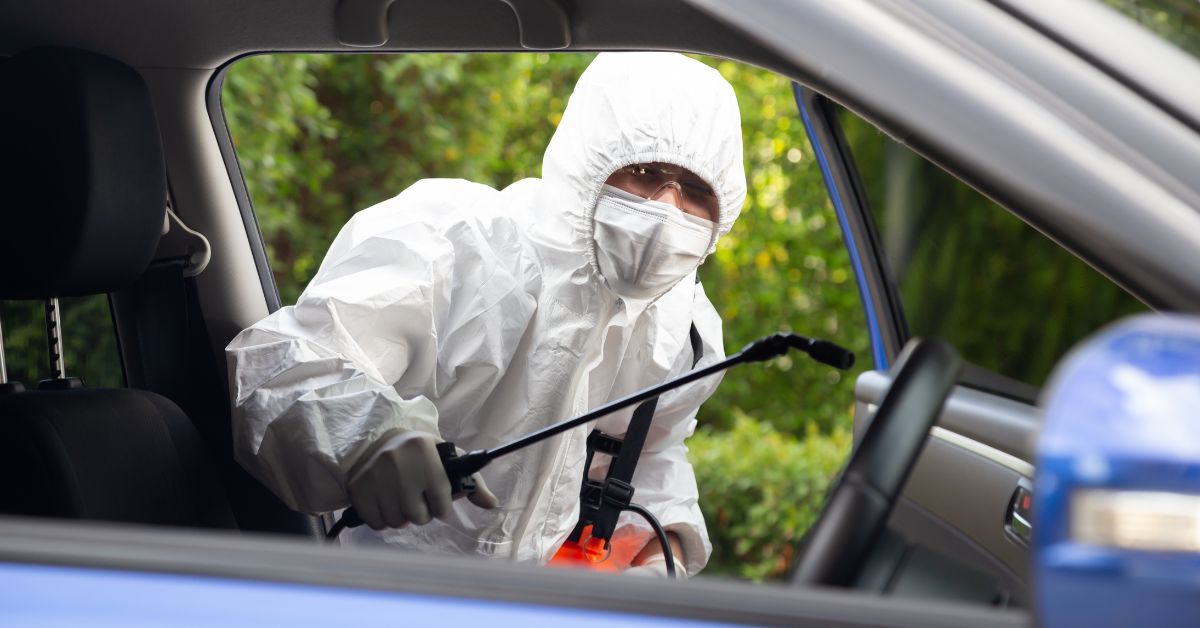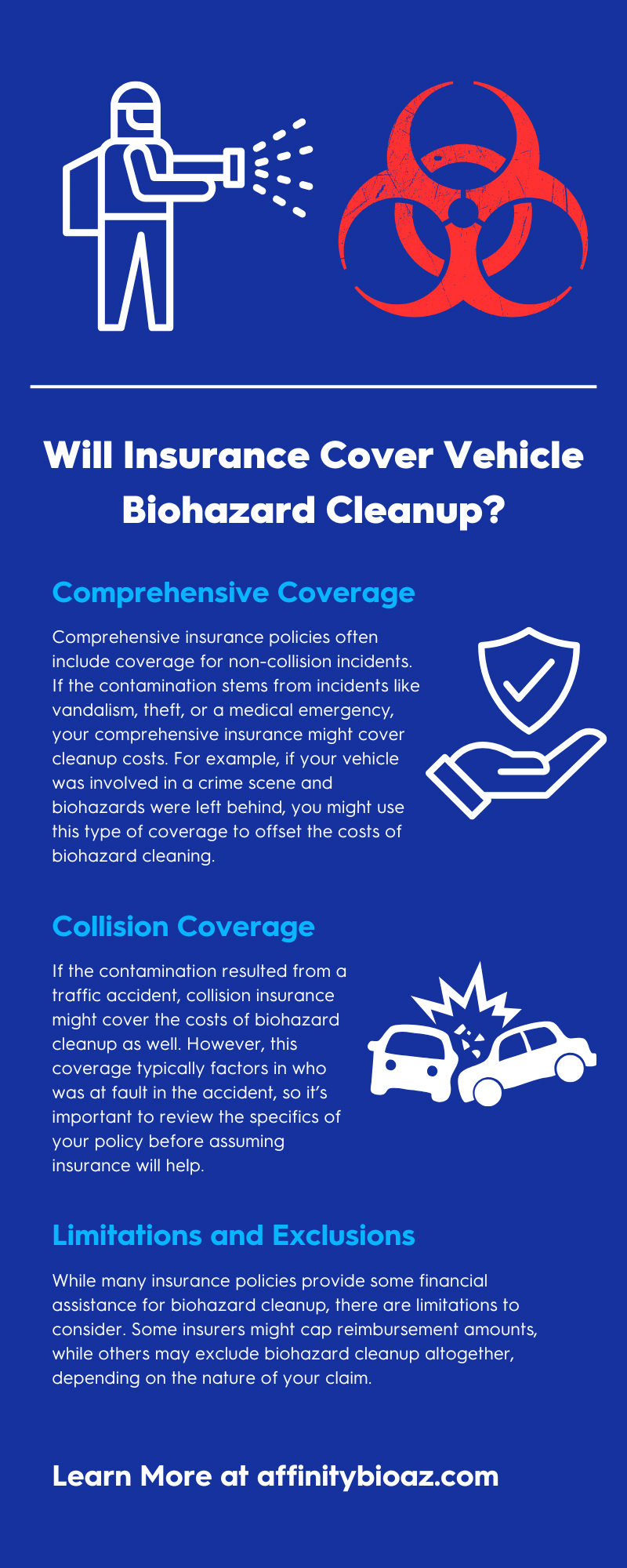
Accidents, spills, or other biohazard situations in vehicles can happen unexpectedly. Properly addressing these situations is crucial for safety and hygiene, but who ends up footing the bill? Will you have to pay for cleanup expenses out of pocket or will insurance cover vehicle biohazard cleanup?
The answer varies depending on your insurance policy and the specific circumstances of the incident. If you’re in Arizona and dealing with this unfortunate situation, understanding your options and how to handle cleanup will save you stress, time, and money.
This guide will walk you through vehicle biohazard cleanup, what it involves, when insurance might cover it, and the steps you can take to ensure your vehicle is cleaned and restored properly.
What Is Vehicle Biohazard Cleanup?
Vehicle biohazard cleanup refers to professionally cleaning and decontaminating your car after exposure to biological hazards. These include blood, bodily fluids, animal waste, and other potentially infectious materials. Unlike regular cleaning, biohazard cleanup eliminates harmful pathogens and hazards that could affect your health and safety.
Simply wiping down surfaces is not enough when biohazards are involved. The risk of exposure to viruses, bacteria, fungi, and toxins is high, and improper handling can lead to contamination, which may affect you and future users of the vehicle. Biohazard cleanup professionals use specialized tools and techniques, including disinfectants approved by regulatory agencies, for thorough cleaning.
When Do You Need Vehicle Biohazard Cleanup?
Some common scenarios that may require vehicle biohazard cleanup include:
- After an accident: Car accidents that result in injuries may leave behind blood or other bodily fluids throughout the vehicle.
- Medical emergencies: Ambulances or personal vehicles used to transport someone who is ill or injured may require decontamination.
- Animal infestations: Rodents or pests can leave urine and feces in your vehicle that may pose health risks.
- Vandalism: Instances of intentional damage, like graffiti or waste dumps, can also lead to biohazards.
If you’re seeking vehicle biohazard cleanup in Arizona, look no further than Affinity Bio Solutions. Our trained team specializes in meticulous cleaning techniques so your vehicle is returned to a safe and hygienic state.
Insurance and Biohazard Cleanup: What’s Covered and What Isn’t?
The financial burden of biohazard cleanup can be substantial in certain instances. Costs depend on the severity of contamination and the scope of cleanup required, and this is where insurance matters. Auto insurance generally falls under different tiers of coverage, which may influence whether your cleanup costs are reimbursed. Here’s more information about the various insurance tiers.
Comprehensive Coverage
Comprehensive insurance policies often include coverage for non-collision incidents. If the contamination stems from incidents like vandalism, theft, or a medical emergency, your comprehensive insurance might cover cleanup costs. For example, if your vehicle was involved in a crime scene and biohazards were left behind, you might use this type of coverage to offset the costs of biohazard cleaning.
Collision Coverage
If the contamination resulted from a traffic accident, collision insurance might cover the costs of biohazard cleanup as well. However, this coverage typically factors in who was at fault in the accident, so it’s important to review the specifics of your policy before assuming insurance will help.
Limitations and Exclusions
While many insurance policies provide some financial assistance for biohazard cleanup, there are limitations to consider. Some insurers might cap reimbursement amounts, while others may exclude biohazard cleanup altogether, depending on the nature of your claim.
For policies with no coverage for cleanup services, you’ll need to cover these costs out of pocket. This is why carefully reviewing your insurance contract and speaking with your provider is critical. Ask your provider these specific questions:
- Does my policy include comprehensive coverage?
- Does my comprehensive coverage extend to biohazard cleanup?
- Are there limits or exclusions to this coverage?
Steps for Filing an Insurance Claim for Vehicle Biohazard Cleanup
Filing an insurance claim for vehicle biohazard cleanup can be a multistep process. Still, it’s manageable if you approach it strategically. Here’s a full guide to streamline your efforts.
Step 1: Document the Damage
Take clear, detailed photos of the contaminated areas and the exterior of your vehicle (especially if it was damaged in an accident). Having strong documentation will strengthen your case when presenting your claim to insurers.
Step 2: Contact Your Insurance Provider
Inform your insurance provider about the contamination and explain the event in detail. Use clear, factual language, and be upfront with relevant information, such as incident reports or medical records.
Step 3: Confirm Coverage Details
Speak with your insurer to confirm whether your policy covers biohazard cleanup. If they confirm coverage, request detailed information about the claims process, including necessary paperwork or approved service providers.
Step 4: Partner With a Professional Cleanup Service
Choose a licensed and professional vehicle biohazard cleanup provider, such as Affinity Bio Solutions in Arizona. Most insurers require you to use an approved or certified service to ensure the job complies with safety regulations.
Step 5: Submit Your Claim
After the cleanup is complete, submit the invoice and other required documentation from the service provider to your insurance company for reimbursement. Keep track of all communications and paperwork, as these records may come in handy if further discussions with your insurer occur.
Step 6: Follow Up As Needed
Claims sometimes take a while to process, and insurers may need additional information to approve them. Stay proactive by following up on the status of your claim and providing requested details promptly.
Navigating biohazard contamination in your vehicle can be challenging, but with the right information and support, it’s doable. Remember to document the damage, partner with a trusted cleanup provider, and stay informed about your insurance policy.
If you’re still unsure if your insurance will cover vehicle biohazard cleanup, don’t hesitate to reach out to your insurer for guidance. Taking action quickly will prevent further complications for greater safety in your everyday travels.

